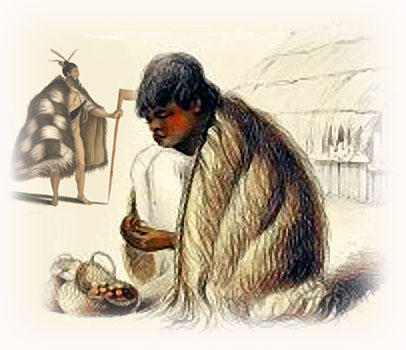Home - Kiwi Songs - Maori Songs - Search - Donate
Te Rauparaha would have learnt this old haka in his teen-age years.
|
Kikiki
kakaka! |
I'm
jabbering and quivering, |
|
|
 "Motupoi Pah with Tongariro" - George Angas 1844 |
Te Rauparaha's escape
Te Rauparaha arrived at the northern shore of Lake Taupo in about 1810 and was told that two Ngati Te Aho chiefs were waiting to destroy him.
So he made his escape south, heading for the Whanganui coast. He sailed down to the south west shore of Lake Taupo then walked to Motu-o-puhi Pa on an island in Lake Rotoaira.
The Ngati Aho war party arrived in hot pursuit, and the Motu-o-puhi chief Wharerangi invited them in to search the place. He had hidden Te Rauparaha in a kumara pit and had told his wife to sit on top of it.
The woman's rear end was millimetres from Te Rauparaha's face. He was half-suffocating. He recalled the words of the old haka. "Kikiki kakaka,... Kei waniwania taku aro...
Fear gripped him when he heard the war party arrive, "Ka wehi au, and he realized he was caught in a trap. "Mau au e koro e.... He thought he was done for when the chief's wife moved away. "Ka mate, ka mate... But his pursuers had departed. "Ka ora, ka ora... Instead he saw the hairy legs of the local chief who had hid him. "Tenei te tangata puhuruhuru... Exhausted, humiliated, half-suffocated and in shock, he climbed up out into the sunshine. "Whiti te ra... He gave vent to his feelings of relief by chanting the the old "Kikiki" haka out loud.
 Te Rangikoaea sat on top of the kumara pit |
Te Rauparaha's haka
Civil war gripped Aotearoa over the next 30 years. Warring factions obtained firearms from European traders in return for flax fibre and land. Te Rauparaha developed a trading and raiding base on Kapiti Island and grew in status to overlord of central New Zealand, from Whanganui to Akaroa.
Then thousands of Europeans flooded onto the land that had been traded to them, and they started forcing their way onto Maori-owned land as well. Te Rauparaha became a respected national leader in the Maori opposition to these foreign usurpers.
Kikiki/Ka Mate became known as Te Rauparaha's haka, as the story of his ingenious response to overwhelming odds gave this old haka a new interpretation that provided a morale booster to those facing the flood of British settlers.As the years have passed by, Kikiki/Ka Mate has gone from being a haka 'about' Te Rauparaha to one 'composed by' Te Rauparaha.
A caring home for Kikiki
Kikiki is far too complex and subtle to be an off-the-cuff composition by one man who was exhaused, frightened and half-suffocated. He would only have been capable of chanting fragments of verses already well known to him.
In actual practice, composition of a top-quality haka was a group process of intelligent creative effort. Members of the group customarilly trialled and modified the words and actions.However, when the Ngati Toa people attributed the haka to Te Rauparaha, they increased its mana and also gave it a 'turangawaewae,' a place where it belonged and where it was cared for.
NEXT - 12. Te Rauparaha's life. Home - Kiwi Songs - Maori Songs - Search - Donate
Patricia Burns, Te Rauparaha, A New Perspective (Penguin, 1983) pp 44-48.
James Cowan,
The Maoris in the Great War: (Maori Regimental Committee, Auckland, 1926) p 181.
Ka Mate, Ka Mate, (NZ Railways Magazine, February 1, 1935)John Te H Grace, Tuwharetoa : the history of the Maori people of the Taupo district. (Reed, 1959)
Mervyn McLean, Maori Music (University of Auckland Press 1996)
Published on Folksong.org.nz in
Sept 2008
© 2008 by John Archer